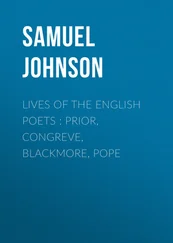Samuel Johnson - Notes to Shakespeare, Volume III - The Tragedies
Здесь есть возможность читать онлайн «Samuel Johnson - Notes to Shakespeare, Volume III - The Tragedies» — ознакомительный отрывок электронной книги совершенно бесплатно, а после прочтения отрывка купить полную версию. В некоторых случаях можно слушать аудио, скачать через торрент в формате fb2 и присутствует краткое содержание. Жанр: foreign_prose, Критика, literature_18, foreign_antique, на английском языке. Описание произведения, (предисловие) а так же отзывы посетителей доступны на портале библиотеки ЛибКат.
- Название:Notes to Shakespeare, Volume III: The Tragedies
- Автор:
- Жанр:
- Год:неизвестен
- ISBN:нет данных
- Рейтинг книги:5 / 5. Голосов: 1
-
Избранное:Добавить в избранное
- Отзывы:
-
Ваша оценка:
- 100
- 1
- 2
- 3
- 4
- 5
Notes to Shakespeare, Volume III: The Tragedies: краткое содержание, описание и аннотация
Предлагаем к чтению аннотацию, описание, краткое содержание или предисловие (зависит от того, что написал сам автор книги «Notes to Shakespeare, Volume III: The Tragedies»). Если вы не нашли необходимую информацию о книге — напишите в комментариях, мы постараемся отыскать её.
Notes to Shakespeare, Volume III: The Tragedies — читать онлайн ознакомительный отрывок
Ниже представлен текст книги, разбитый по страницам. Система сохранения места последней прочитанной страницы, позволяет с удобством читать онлайн бесплатно книгу «Notes to Shakespeare, Volume III: The Tragedies», без необходимости каждый раз заново искать на чём Вы остановились. Поставьте закладку, и сможете в любой момент перейти на страницу, на которой закончили чтение.
Интервал:
Закладка:
IV.iii.48 (397,8) already in the entertainment] That is, tho' not actually encamped, yet already in pay . To entertain an army is to take them into pay.
IV.iv.22 (398,1)
So, with me:—
My birth-place hate I, and my love's upon
This enemy's town:—I'll enter: if he slay me]
He who reads this [My country have I and my lovers left;/This enemy's town I'll enter] would think that he was reading the lines of Shakespeare: except that Coriolanus, being already in the town, says, he will enter it . Yet the old edition exhibits it thus
— So with me.
My birth-place have I; and my loves upon
This enemic towne; I'll enter if he slay me , &c.
The intermediate line seems to be lost, in which, conformably to his former observation, he says, that he has lost his birth-place, and his loves upon a petty dispute, and is trying his chance in this enemy town , he then cries, turning to the house of Anfidius, I'll enter if he slay me .
I have preferred the common reading, because it is, though faulty, yet intelligible, and the original passage, for want of copies, cannot be restored.
IV.v.76 (403,3) a good memory] The Oxford editor, not knowing that memory was used at that time for memorial , alters it to memorial .
IV.v.90 (403,4) A heart of wreak in thee] A heart of resentment.
IV.v.91 (403,5) maims/Of shame] That is, disgraceful diminutions of territory.
IV.v.207 (406,5) sanctifies himself with's hands] Alluding, improperly, to the act of crossing upon any strange event.
IV.v.212 (407,6) He will go, he says, and sowle the porter of Rome gates by the ears] That is, I suppose, drag him down by the ears into the dirt. Souiller , Fr.
IV.v.214 (407,7) his passage poll'd] That is, bared, cleared .
IV.v.238 (408,8) full of vent] Full of rumour , full of materials for discourse .
IV.vi.2 (408,1) His remedies are tame i' the present peace] The old reading is,
His remedies are tame, the present peace.
I do not understand either line, but fancy it should be read thus,
—neither need we fear him;
His remedies are ta'en, the present peace,
And quietness o' the people,—
The meaning, somewhat harshly expressed, according to our authour's custom, is this: We need not fear him , the proper remedies against him are taken , by restoring peace and quietness .
IV.vi.32 (410,2) affecting one sole throne,/Without assistance] That is, without assessors ; without any other suffrage.
IV.vi.51 (411,3) reason with the fellow] That is, have some talk with him. In this sense Shakespeare often uses the word.
IV.vi.72 (412,4) can no more atone] To atone , in the active sense, is to reconcile , and is so used by our authour. To atone here, is, in the neutral sense, to come to reconciliation . To atone is to unite .
IV.vi.85 (412,5) burned in their cement] [W: "cement" for "cincture or inclosure"] Cement has here its common signification.
IV.vi.98 (413,5) The breath of garlick-eaters!] To smell of garlick was once such a brand of vulgarity, that garlick was a food forbidden to an ancient order of Spanish knights, mentioned by Guevara.
IV.vi.112 (414,7)
they charge him even
As those should do that had deserv'd his hate,
And therein shew'd like enemies]
Their charge or injunction would shew them insensible of his wrongs, and make them shew like enemies . I read shew , not shewed, like enemies .
IV.vi.124 (414,8) They'll roar him in again] As they hooted at his departure, they will roar at his return; as he went out with scoffs, he will come back with lamentations.
IV.vii.37 (417,1)
whether pride,
Which out of daily fortune ever taints
The happy man; whether]
Ausidius assigns three probable reasons of the miscarriage of Coriolanus; pride, which easily follows an uninterrupted train of success; unskilfulness to regulate the consequences of his own victories; a stubborn uniformity of nature, which could not make the proper transition from the casque or helmet to the cushion or chair of civil authority ; but acted with the same despotism in peace as in war.
IV.vii.48 (418,2) he has a merit,/To choak it in the utterance] He has a merit, for no other purpose than to destroy it by boasting it.
IV.vii.55 (418,4) Right's by right fouler] [W: fouled] I believe rights , like strengths , is a plural noon. I read,
Rights by rights founder, strengths by strengths do fail .
That is, by the exertion of one right another right is lamed.
V.i.20 (420,2) It was a bare petition] [ Bare , for mean, beggarly. WARBURTON.] I believe rather, a petition unsupported, unaided by names that might give it influence.
V.i.63 (422,4) I tell you, he does sit in gold] He is inthroned in all the pomp and pride of imperial splendour.
[Greek: Chruzothronos Aerae]—Hom.
V.i.69 (422,5) Bound with an oath to yield to his conditions] This if apparently wrong. Sir T. Hanmer, and Dr. Warburton after him, read,
Bound with an oath not to yield to new conditions .
They might have read more smoothly,
—to yield no new conditions.
But the whole speech is in confusion, and I suspect something left out. I should read,
—What he would do,
He sent in writing after; what he would not,
Bound with an oath. To yield to his conditions.
Here is, I think, a chasm. The speaker's purpose seems to be this: To yield to his conditions is ruin, and better cannot be obtained, so that all hope is vain .
V.ii.10 (424,7) it is lots to blanks] A lot here is a prize .
V.ii.17 (424,8)
For I have ever verify'd my friends,
(Of whom he's chief) with all the size that verity
Would without lapsing suffer]
[W: narrified] [Hanmer: magnified] If the commentator had given any example of the word narrify , the correction would have been not only received, but applauded. Now, since the new word stands without authority, we must try what sense the old one will afford. To verify is to establish by testimony . One may say with propriety, he brought false witnesses to verify his title. Shakespeare considered the word with his usual laxity, as importing rather testimony than truth , and only meant to say, I bore witness to my friends with all the size that verity would suffer .
V.ii.45 (426,1) the virginal palms of your daughters] [W: pasmes or pames , French for "swooning fits." Warburton also quotes Tarquin and Lucrece , "To dry the old oak's sap, and cherish springs" and emends to "tarnish," from the French, meaning "to dry up," used of springs and rivers.] I have inserted this note, because it contains an apology for many others. It is not denied that many French words were mingled in the time of Elizabeth with our language, which have since been ejected, and that any which are known to have been then in use may be properly recalled when they will help the sense. But when a word is to be admitted, the first question should be, by whom was it ever received? in what book can it be shown? If it cannot be proved to have been in use, the reasons which can justify its reception must be stronger than any critick will often have to bring. Even in this certain emendation, the new word is very liable to contest. I should read,
Читать дальшеИнтервал:
Закладка:
Похожие книги на «Notes to Shakespeare, Volume III: The Tragedies»
Представляем Вашему вниманию похожие книги на «Notes to Shakespeare, Volume III: The Tragedies» списком для выбора. Мы отобрали схожую по названию и смыслу литературу в надежде предоставить читателям больше вариантов отыскать новые, интересные, ещё непрочитанные произведения.
Обсуждение, отзывы о книге «Notes to Shakespeare, Volume III: The Tragedies» и просто собственные мнения читателей. Оставьте ваши комментарии, напишите, что Вы думаете о произведении, его смысле или главных героях. Укажите что конкретно понравилось, а что нет, и почему Вы так считаете.












